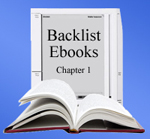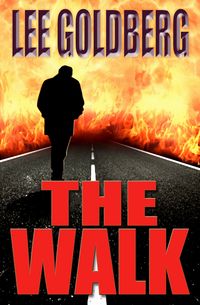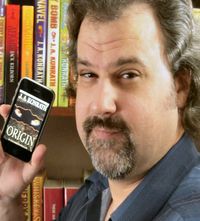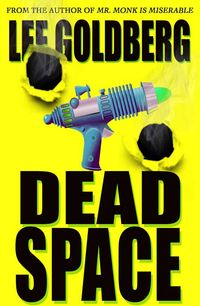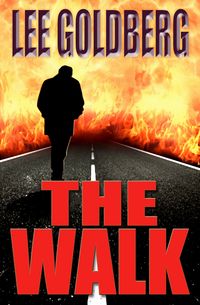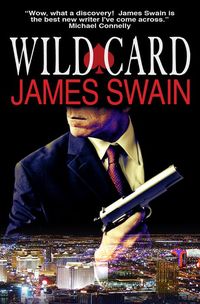 James Swain has started to put his out-of-print backlist of terrific crime novels — including THE PROGRAM, WILD CARD, and THE MAN WHO CHEATED DEATH – on the Kindle. They represent a sampler of sorts of his three series for readers unfamiliar with his work… which has won wide and enthusiastic praise (I've always liked this rave that he got from The New York Times: "Swain uses language with such blunt force he could be hammering in nails”).
James Swain has started to put his out-of-print backlist of terrific crime novels — including THE PROGRAM, WILD CARD, and THE MAN WHO CHEATED DEATH – on the Kindle. They represent a sampler of sorts of his three series for readers unfamiliar with his work… which has won wide and enthusiastic praise (I've always liked this rave that he got from The New York Times: "Swain uses language with such blunt force he could be hammering in nails”).
I thought this would be a good time to catch up with him and get his views on his career, the publishing industry and the new world of ebooks…
LEE: Your early books — like GRIFT SENSE, FUNNY MONEY, and SUCKER BET — are all set against the world of gambling and cons. Were you writing about what you know?
JAMES: Yes, I was. I’ve been a magician since I was a kid, and used to hang out with guys in New York who cheated in private card games. They’d come into Tannen’s magic shop and blow our minds with their skill. In the late 1970s, I was visiting Las Vegas, and saw a guy switch a card while playing blackjack. It was amazing how skillful he was. I later told a magician friend of mine named Mike Skinner who lived in Las Vegas and knew a thing or two about cheating. Skinner proceeded to tell me how the casinos got ripped off all the time by cross roaders, which is a hustler’s term for people who cheat casinos (it refers to parking your horse at the cross roads in a town in case you need to make a speedy getaway). I started researching the subject, and met a number of famous cheaters, and collected their stories. Twenty years later when I started writing the gambling books, I had a wealth of information to work from.
LEE: You branched off into other series… was that a creative decision (to stretch yourself as a writer), a marketing decision (to broaden your brand) or were sales of the Valentine series tapering off?
JAMES: It was a fluke. The Valentine books were doing just fine, and had been sold in many foreign markets and also to Hollywood. I’d written nine of them, with two more set to be published –WILD CARD and JACKPOT. I needed a break, and wrote a book called MIDNIGHT RAMBLER, which is about a down-and-out ex-cop who helps police departments in Florida find missing people. I didn’t tell anyone about RAMBLER except my wife – it was my little secret, just to see if I could do something else. When I was done, I showed it to my agent, and he called me up, and started yelling how good it was. He showed it to my publisher, and they reacted the same way. The next thing I knew, I had a new contract and a new series, and the Valentine books were put on hold.
LEE: How did you feel about that? Was it hard to see those books put on the shelf?
JAMES: It was gut-wrenching. I loved those books, especially the last two. But it’s difficult to argue with your publisher when they’re throwing money at you. I bit my tongue and accepted it. 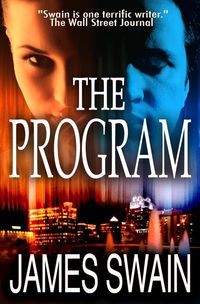
LEE: What's your take on the state of publishing today? If you'd written GRIFT SENSE today, would it get published? Do you think it would receive the same kind of enthusiastic support and wide notice you got back in 2001?
JAMES: To be honest, I didn’t get much support when GRIFT SENSE was published. I paid for my own tour, and did most of my own marketing. The book was purchased by a lovely editor at Pocket Books named Emily Heckman, who was let go before the book came out. There wasn’t much support for it in-house.
The support I did get was from the mystery field, which pushed the book heavily. For example, Otto Penzler gave the book to a customer named Anthony Mason, who’s a newscaster for CBS Sunday Morning. That led to be being on the show a year later, which was a huge break for me.
In 2003, I went over to Ballantine Books, and my editor there purchased GRIFT SENSE and FUNNY MONEY (the 2nd book in the series) from Pocket. Ballantine got behind the books, which led to much of the success I’ve had.
So to answer your question, I really think that publishing today isn’t much different than it was ten years ago when I started. The avenues of distribution have changed, as have the ability to market yourself over the Internet, but at the end of the day, it’s still about hard work and catching some lucky breaks.
LEE: You've recently released a bunch of your books on the Kindle (and other e-formats). What prompted you to do that? And would you ever consider writing an original book directly for the Kindle, bypassing publishers altogether? If so, why?
JAMES: My decision to release books as ebooks was brewing for a while. The two Valentine books I mentioned earlier had reverted by contract back to me. I also had a thriller called THE PROGRAM which my agent had been shopping around, then had to pull when I got an offer from Tor to do a new series. So I had these three terrific books sitting on my laptop, which bothered me no end.
Then I bought my wife an iPad, and to my surprise (and hers), she fell absolutely in love with it, and started reading 4-5 ebooks a week on it. That got me thinking that maybe I should take these books I had, and release them as ebooks.
The turning point was hearing Joe Konrath speak at the Mysteries To Die For conference in Sarasota this past summer. Joe answered every question I had about the process, and gave me the confidence to put these books out. Will I ever write an original book directly for Kindle? The answer is yes. I’m working on a new Valentine novel right now, and plan to release it in the spring of 2011.
LEE: You've gotten some terrific blurbs from authors like Lee Child, Michael Connelly and Randy Wayne White. How important do you think blurbs from other authors are in selling your work to booksellers and readers? Have blurbs lost their punch or are they even more necessary today to rise above all the clutter out there?
JAMES: Blurbs are very important. They set you apart from the rest of the crowd. They can also tell the reader what they’re in store for. I’ve never released a book without one.

